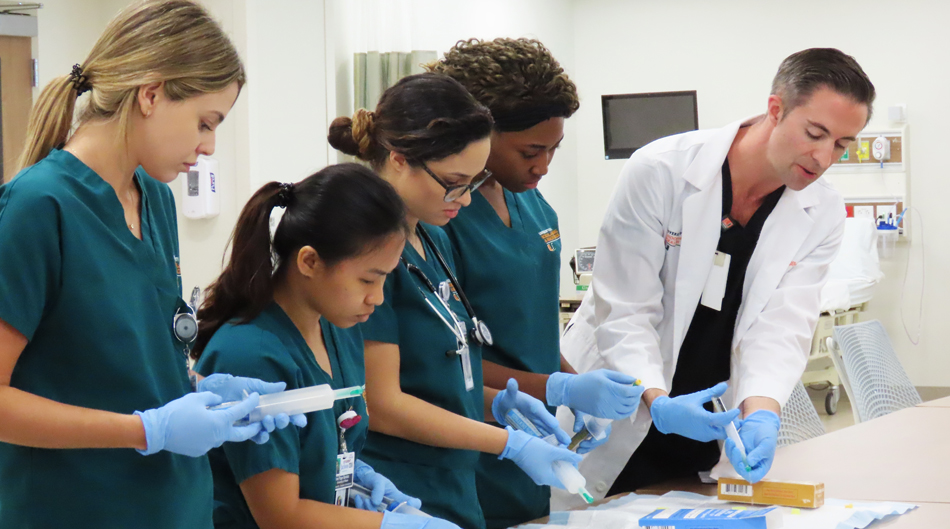Both a nurse specialist on the Simulation Team at S.H.A.R.E.TM and a lecturer in nursing at the University of Miami School of Nursing and Health Studies, Dr. Evan McEwing holds certifications in quality assurance for clinical practice, clinical research, and advanced public health nursing. On the Sim Team since 2016, he earned his doctor of nursing practice degree from the University of Massachusetts, Amherst. The journal Nursing Education Today recently published Dr. McEwing’s scholarly article, Delivering culturally competent care to the lesbian, gay, bisexual, and transgender (LGBT) population: Education for nursing students. “I am very interested in examining health care provider attitudes, knowledge, and skills for working with LGBTQIA+ community,” he explains. “I love the intersection of public health and simulation because I have seen how simulation can help students understand some of the more intangible concepts that are essential to public health.”
How did you get into simulation?
My career has had no straightforward and obvious trajectory. I originally pursued the arts and spent several years as a modern dancer. Through a series of strange life events, I ended up working in clinical trials, which, in turn, led me to nursing. I had no simulation experience in my nursing program, and I wish I had! I was lucky to start working in simulation while pursuing my DNP, and I incorporated a simulation element into my final doctoral project. In hindsight, I wonder if my love of the arts has contributed to my love of playing various roles in simulation—so far I’ve been a father, brother, uncle, partner, and son to our mannequins.
What’s a typical work day like for you?
One of the best parts of simulation is that there really isn’t a typical work day. One day we might be helping students with hands-on practice for codes and the next we are running a pediatric simulation about detecting potential child abuse. The variety of what we do always keeps the work fresh and exciting.
What's your favorite part about working at S.H.A.R.E.?
We have an incredible simulation team of faculty, nurse specialists, and simulation technologists. Working with such creative and talented people is a real joy. The diversity of talent within the simulation team enables us to approach teaching in simulation from multiple perspectives. We’re always trying new things to give our students the best possible learning experience.
Why simulation?
Simulation allows students to practice nursing skills and critical thinking in a safe, non-judgmental environment. For me, the beauty of simulation is watching students grow in their clinical reasoning and self-reflection throughout the nursing program. The impact simulation can have on student learning is incredible. Plus, simulation can help students’ confidence by allowing them to practice and make mistakes on a mannequin as opposed to a human. This kind of confidence is critical for nursing students who have to master a lot of content in a short amount of time.
What helped you get through 2020?
Well, my partner describes me as “relentlessly positive” so that’s been a big factor in my resilience. Other than that, I’m a meditator and a gardener, and both of those things have really helped center me. Gardening, especially my total obsession with orchids, has helped give me a sense of nurturing life during such a dark time. As a nurse, I follow closely what my friends in clinical practice are going through, and my heart goes out to every nurse working on the front lines. Ultimately, I think keeping perspective on my own privilege has helped me to feel grateful and positive.

